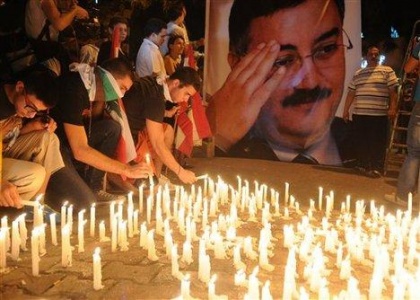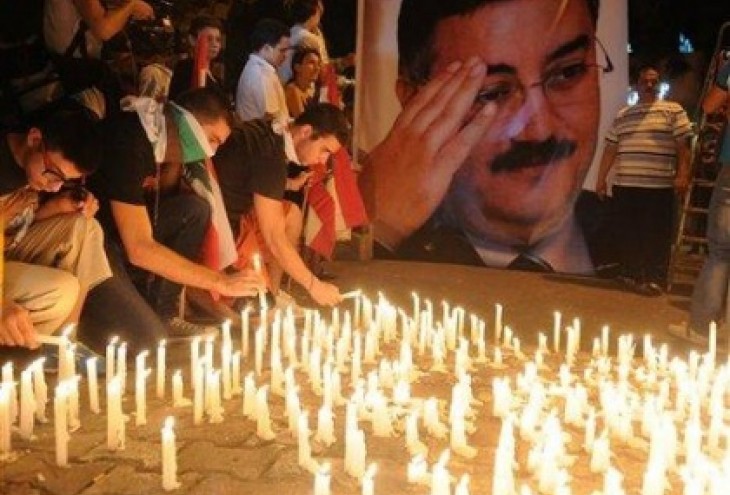
Sultan Akimbekov
Among the latest events in the Middle East, undoubtedly ones most remarkable are unrests in Lebanon, where inter-communal conflicts commenced, following the assassination of the Sunni Brigadier General of the Lebanese Internal Security Forces, Wissam Adnan Al-Hassan.
Characteristic is the fact that Lebanese Sunnies immediately accused Syria of that assassination, which action is rather in line with the Sunni-Shiah confrontation, which confrontation, in its turn, acquired the global magnitude, in the recent past time. It is understandable that Sunnis of Lebanon support their fellow communities in Syria, where local Shiahs and Alawis act on the side of the official regime of Damask.
At the same time, protesters attacked the governmental buildings and their leaders produced rather robust addresses to government and prime-minister, encouraging the latter two to resign. The thinness of the situation is in the fact that Prime-Minister Maliki is from Sunni community and holds his post in accordance to quotas granted to the Sunni community, by Lebanese Constitution.
He, however, entered into his present office in accordance with agreements with the Shiah Party of Hezbollah, which party, due to those agreements, first acquired seats in the Cabinet of Ministers. The present government of Lebanon is a bizarre coalition of Hezbollah, some Sunnis and Christians. Politically, it is different from the previous ruling coalition headed by Saad Hariri, the son of assassinated Prime-Minister Rafik Hariri and the difference is in more loyal attitude to the regime in Syria.
In the past, Hezbollah’s introduction into the government was viewed on as an undoubted success achieved by Iran and Damask. Specifically, taking in account the accusations against Hezbollah for the connection between some of its members and the assassination of Hariri. The latter, circumstance, however, did not cease Hezbollah from participation in the present government. In the time of those events, one of explanations to Hezbollah’s appearance in the leadership of the country was that the country expected that Hezbollah, through the participation in the official political life, would acquire respectability and become less radical. All looked, as if Lebanese Shiahs were offered increase in the political status in exchange to more predictability. As for the Hariri assassination, it was always kept available for potential reactivation.
Following the introduction into the national government, Hezbollah leaders were supposed to, theoretically, be driven with common state interests and thus, refer to the positions of partners in the governmental coalition – Christians, Druses and some Sunnis. For example, in case of a conflict, Shiah guerillas, instead of immediate shoot-out would rather wait on appearance of a consolidated position from the government and such attitude would be legitimate not only in regards to Israel, but situation around Iran, as well.
It is not a secret that Hezbollah is in financial and political dependence on Iran. Consequently, if there is a conflict associated with the Iranian nuclear program, Hezbollah will automatically begin to act on the side of Iran. And the assault against Israel will be the most logical step.
However, after the war of 2006, Hezbollah guerillas had no encounters with Israel, because they are now separated from Israel with the European expeditionary force. Should Shiahs attempt to attack Israel, they will have to bombard its territory with their rockets over positions of said force, which action will threaten to cause of global conflict that would involve NATO. If we discuss Hezbollah as a marginal military organization in close affiliation to Iran, then a military conflict would not be a problem, even if there was no hope to succeed. But for a political party participating in the government, the possible assault on Israel, likewise other forms of participation in the conflict constitute a problem of choice of the course of behavior that would account for long-term interests of whole Shiah community and offer more responsible behavior.
We may suppose that the inclusion of Hezbollah leaders in the government was the action that was driven by the understanding that despite the fact that Hezbollah was the unification of all Lebanese Shiahs, it was not homogenous in structure. Likewise anywhere in the Orient, Hezbollah rests on the foundation of communities that Arabs name Homuls and Homuls have local leaders. Earlier they were parts of the Amal Shiah movement, later they joined Hezbollah, mainly for significant donations from Iran and consequently broad financial opportunities of the new organization.
Money is an important affair, especially in the Middle East. Local Shiah leaders are ready to fight for idea, but not until the very last soldier. That makes them different from the political leadership of Hezbollah headed by Sheikh Nasrallah. Presence in the government is a serious step towards higher status of the Shiah community. Shiah community’s common interest is to keep such situation for a long-term perspective, and taking in account the percentage of Shiahs in the Lebanese population.
The political wing of Hezbollah, however, is an active participant in the Sunni-Shiah confrontation. In particular, there were communications that Hezbollah members took part in the Syria belligerent activities. And because the situation moves towards a big war, the urgent question is where what sides will take what positions in the case of the commencement of a global conflict.
We must note that the assassination of the Sunni General encouraged Lebanese Sunnis and Christians to create a coalition. It s confrontation with the government, first of all, is positioned as the struggle against Hezbollah. The latter organization’s Sunni, Druse and Christian supporters face a complicated situation, because the logic of events moves the parties towards a Sunni-Shiah confrontation and all those domiciled in potentially belligerent zones must finalize their attitudes. Including those Shiahs who do not want suffer from a global conflict around Syria and Iran.
Such Shiahs do exist. First of all, those are Shiahs of Iraq. They, generally, are sympathetic to Tehran and fellow Muslims, but are not ready to lose benefits they presently possess in their oil rich country. Until recently, it was believed that Alawi Shiahs of Syria would choose to step aside and agree to take part in negotiations, likewise was in Yemen, but they chose to resist. Now, Shiahs of Lebanon will have to make their own choice.
The newly formed coalition of the Sunnis and Christians of Lebanon may imply other important consequences, because the purpose of said coalition was to smoothen the well-known concerns of the Lebanese Christians, which Christians support Assad today. They, rather justifiably, fear the victory of the Sunnis, because the latest events in Lebanon appear as some kind of food for their brainstorming activity. Curious is the fact that the blast killing Sunni Al-Hassan was activated in the Christian district of Beirut.
Characteristic is the visit paid to Gaza Strip by Qatar Emir al-Tani. Despite the routine protests expressed by Israel, it was obvious that the purpose of the visit of the change of sponsor to Hamas. Please note that said Sunni movement refused to support Syrian leadership in the present conflict and withdrew its headquarters from Damask. Hamas also used to receive money from Iran, likewise does now Hezbollah. In response to that, Tehran ceased financing.
On its behalf, Qatar agreed to provide USD400 million to Hamas, and said figure is not the last limit. And because Qatar is a leader of the Anti-Shiah Front, we may suppose that during secret negotiations al-Tani asked Hamas to refrain from assault on Israel, should a conflict with Iran begin, or, at least, not to fight too hard.
In their turn, Hamas guerillas, at the brink of al-Tani’s visit launched several rockets to Israel, so to demonstrate own decisiveness. That appears to be rather useful to negotiations, as it helps Palestinians keep the face. In the Orient, it will always be essential to resolve a complicated situation with the loss of face.



